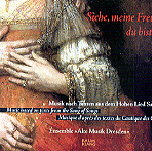The title of this disc should have just said “17th century German vocal music with texts from the Song of Songs by composers with ties to Saxony”. (The two exceptions are solo motets by Italians Steffano Bernardi and Giovanni Cima.) All of the German pieces–motets and vocal concertos by Schütz, Melchior Franck, Andreas Hammerschmidt, and Christoph Demantius–employ the concertato style popular in Germany during the early part of the 17th century. The Italian works (from the same period) both show a highly ornamented and emotionally expressive manner to which the soloists, tenor Hermann Oswald and soprano Constanze Backes (who is really outstanding), give full and free rein. Of course, the texts are famous for their sensuality (reinforced here by the provocative cover detail from Rembrandt’s Die Judenbraut), their celebration of love, their ubiquitous appearance at modern wedding ceremonies, and for their dual interpretation as allegory for Christ (the bridegroom) and the Church (the bride). If you know neither German nor Latin, and you aren’t already familiar with the specific language of these Biblical passages, you won’t have much of a clue what these very able and well-matched singers are singing about because no other translations are provided. If you’re so inclined, however, you can easily look them up because the chapter and verses for each text are listed.
I’m not a big fan of pre-Bach German vocal music–too formal and rule-bound; the stop/start nature of the vocal concerto style makes me jumpy; the harmonic structures are repetitive and predictable–but if you like this sort of thing, you can’t really go wrong with the music or the musicians on this disc. For the reasons just mentioned, this stuff is really hard to perform well–the music tries hard to be boring and its success depends entirely on vocal color, personality, and expressiveness, not to mention a crisp, well-articulated instrumental accompaniment. We get all of those things here, including some very sensitive support from the period strings, theorbo, and organ–and, in addition to the excellent soprano solo mentioned above, the motet by Demantius and concerto by Hammerschmidt prove to be surprisingly lovely and worth far more than a casual listen. The sound is vibrant and perfectly balanced throughout all the various configurations of voices and instruments.
































